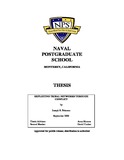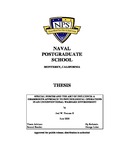Exploiting tribal networks through conflict
| dc.contributor.advisor | Simons, Anna | |
| dc.contributor.author | Peterson, Joseph S. | |
| dc.date.accessioned | 2012-03-14T17:35:42Z | |
| dc.date.available | 2012-03-14T17:35:42Z | |
| dc.date.issued | 2006-09 | |
| dc.identifier.uri | https://hdl.handle.net/10945/2609 | |
| dc.description.abstract | In the current fight against Islamic extremism, the United States is challenged in its ability to isolate and target specific individuals and groups in select regional environments - efforts that are arguably symptomatic of broader shortfalls in US global influence and strategic reach. These particularly troublesome environments are characterized by a lack of State control and are populated with fiercely independent, largely Muslim, and decidedly anti-western communities. Unable to consistently penetrate and influence these "ungoverned" regions, operational intelligence remains sporadic and opportunities limited. No broader, structural change has yet been made that would weaken or sever the links among Islamic extremists and their regional hosts over a sustained period or enable greater cooperation between the US or its allies with indigenous tribal populations. Accordingly, these regions continue to provide ideal locations for terrorist sanctuary, bases of support and operation, and freedom of movement. A supplemental US policy option is required. The challenge thus becomes one of how to create more effective opportunities to gain influence and control over these select tribal regions while countering the influence of competitors over a sustained period. A policy of manipulating tribal fractures and rivalries in order to induce or heighten internal conflict could provide these opportunities. | en_US |
| dc.description.uri | http://archive.org/details/exploitingtribal109452609 | |
| dc.format.extent | xii, 69 p. : col. map ; | en_US |
| dc.publisher | Monterey California. Naval Postgraduate School | en_US |
| dc.subject.lcsh | Social networks | en_US |
| dc.subject.lcsh | Islamic fundamentalism | en_US |
| dc.subject.lcsh | Military art and science | en_US |
| dc.subject.lcsh | History | en_US |
| dc.subject.lcsh | Psychological warfare | en_US |
| dc.subject.lcsh | Terrorism | en_US |
| dc.subject.lcsh | Prevention | en_US |
| dc.subject.lcsh | Islam | en_US |
| dc.subject.lcsh | Terrorists | en_US |
| dc.subject.lcsh | Indians of North America | en_US |
| dc.title | Exploiting tribal networks through conflict | en_US |
| dc.type | Thesis | en_US |
| dc.contributor.secondreader | Tucker, David | |
| dc.contributor.corporate | Naval Postgraduate School (U.S.). | |
| dc.contributor.department | Defense Analysis (DA) | |
| dc.identifier.oclc | 73173883 | |
| etd.thesisdegree.name | M.S. | en_US |
| etd.thesisdegree.level | Masters | en_US |
| etd.thesisdegree.discipline | Defense Analysis | en_US |
| etd.thesisdegree.grantor | Naval Postgraduate School | en_US |
| etd.verified | no | en_US |
| dc.description.distributionstatement | Approved for public release; distribution is unlimited. |
Files in this item
This item appears in the following Collection(s)
-
1. Thesis and Dissertation Collection, all items
Publicly releasable NPS Theses, Dissertations, MBA Professional Reports, Joint Applied Projects, Systems Engineering Project Reports and other NPS degree-earning written works.





